Travel Route 66: exclusive 17 day small group motorcycle tour with free excursion to Milwaukee to visit the Harley-Davidson factory and museum! Best tour ever!
Route 66, AKA "The Mother Road". With its 97 years of history this year, Route 66 began as the road to travel for migrants, dreamers and desperadoes. Later it became a must, for generations of holidaymakers, who wanted to explore the old pathway to the west. The 1950s were Route 66's peak, when thousands of cars drove "bumper-to-bumper" to experience the western emigration route. Hotels, motels, gas stations and other symbols of "Americana" sprung up everywhere along the way. Much of Route 66's original roads, restaurants, gas stations, and landmarks are preserved much as they were in the 50s. In 2024, Route 66 is not only heaven for bikers of all kinds, it’s also one heck of a nostalgia trip.
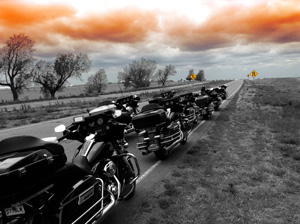
Itinerary (17 days)
Day 1 - Saturday, September 13, 2025: Meet you in Chicago
Welcome to Chicago the 'Windy City'. Meet you downtown at our hotel where we enjoy a great Welcome Dinner and celebration with your fellow riders. Before that you may want to visit some of the highlights Chicago has got to offer: a river sightseeing tour, Willis Tower, Navy Pier, Sphere, some blues or jazz clubs - just to name a few.
Day 2 - Sunday, September 14, 2025 - miles: 142, kilometers: 228
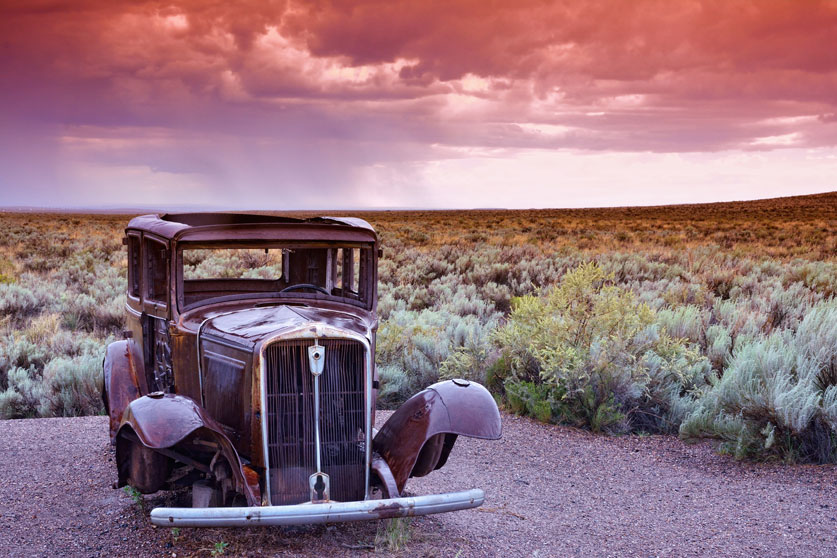
Big day today: We start riding Route 66! When you hear "Gentlemen Start Your Engines" the fab Route 66 starts indeed and we say good-bye to the windy city for good. One hour out of town is Wilmington. For many this is the spot where Route 66 really begins. It’s here that you’ll find that kitsch classic, the Gemini giant. It’s a 30 foot tall fiberglass "muffler man" from the 1960s. Back in those days these giant colossal men were all over the good old US of A. They typically held "tools" in their hands from mufflers, to hot dogs, to axes, and more. In this case, the Gemini Giant holds a rocket ship, a reminder of the 1960s space race. As the American landscape changed most of these enormous men were eventually retired. But here in Wilmington, the large green man holds on.
Continuing on IL 53 to Braidwood, the next photo opportunity is the Polka Dot Drive-In at 222 N. Front St with its Elvis, Marilyn, James Dean and Betty Boop statues.
At 400 S. West St. in Odell, there is a restored Depression-era gas station, which happens to be very cool. It was built in 1932 and served travelers on Route 66 until the 1960s. Then it became a body shop - until that eventually closed its doors in 1975. Years of neglect took their toll on this old Standard station, which is still here today thanks entirely to the preservation efforts of the Illinois Route 66 Association and their Preservation Committee. Check out the glass visible register type pump, in which the amount of gas you wanted to purchase was pumped into the glass tank, and gravity fed it into the fuel tank.
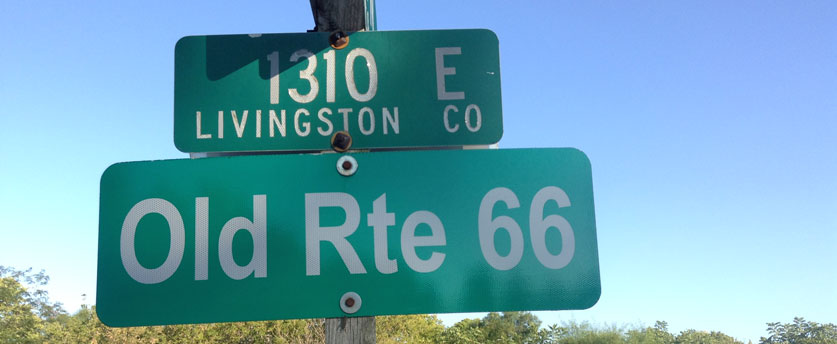
Just a block away from the old Mobil station, an old Catholic Church stands along Route 66. During what might be called the golden days of Route 66 there was a tunnel which ran underneath Route 66 at this very spot, directly between the school and this church. The tunnel was constructed to give children and adults alike safe passage to and from the church. It was eventually filled in after Route 66 and Odell was bypassed by the Interstate.
Further south and before arriving in Pontiac, we stop for a look at number 18700 Old Rt. 66. This is the intersection of Pontiac Rd. (2 lane 66) and the 4 lane Route 66 on the north side of town. Check out the Old Log Cabin Inn. It may look like it’s always been there – but in actual fact it originally faced the much older Route 66 alignment. When the alignment changed the whole building was lifted and turned around 180 degrees.
If we get to Pontiac before 5PM we should visit the museum and Packard showroom in town for a preview of the adventure which lies ahead. Don’t forget to take a picture of the mural on the wall of the museum!
In Towanda at Route 66’s 1954 alignment, an abandoned piece of asphalt with a painted map created by volunteers just reinforces the fact that our journey has only just begun.
Day 3 - Monday, September 15, 2025 - miles: 197, kilometers: 317
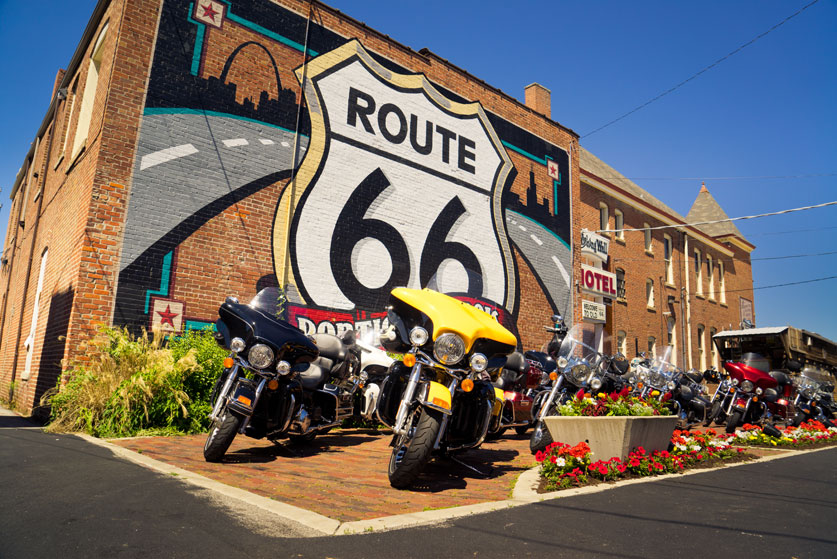
About four miles beyond Shirley, Illinois, we will arrive to Funks Grove Road. This is a secret place that many people miss on their way. We may stop at the Maple Sirup Shop if they can accommodate us.
Soon our bikes will take us to Atlanta IL to check out another huge fibreglass man – this one named Tall Paul. This particular "Muffler Man" stood for many years in front of Bunyon's across town in Cicero, Illinois along Ogden Ave. When Bunyon's closed the owners were offered $10,000 for Tall Paul but decided instead to "permanently loan" it to the City of Atlanta as one of their Route 66 Heritage Exhibits. Tall Paul is accessible 24 hours a day.
Across the street it is Coffee time! We not only have a chance to enjoy espresso shots but we also meet Angel in 'The Palms Grill Cafe' - a great little place with faithfully restored small tables and vinyl-covered chairs that has been serving Route 66 travelers since the 1934!
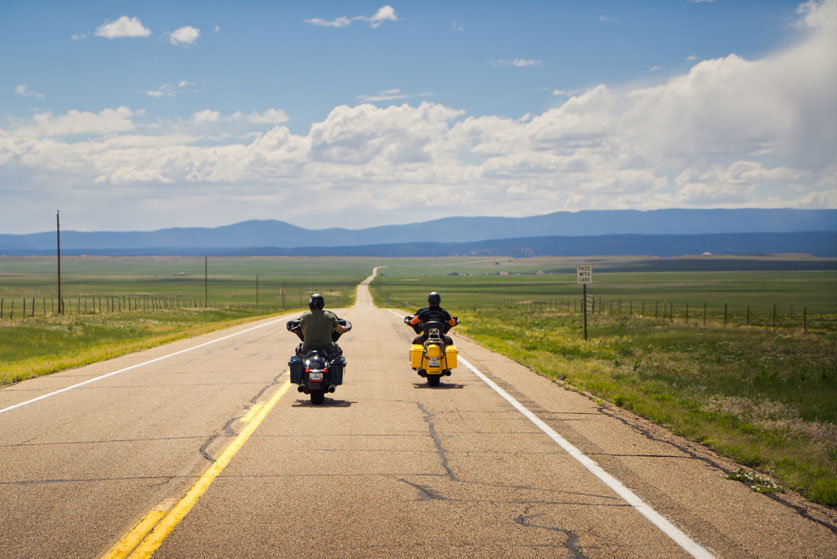
We continue our way to the rare still drivable brick-paved 2 lane roads from 1931! Listed on the National Register of Historic Places, this beautiful 1.4 mile long piece of restored hand-laid brick road is a segment of 66, placed over a concrete roadbed. Located just off this section Rick is waiting for us with antiques, collectibles and great selection of Route 66 souvenirs.
When the original route 66 concrete was laid around Virden IL in 1926 a turkey came out of the wild, did a little walking on the fresh surface and made his marks for the next millennium. Now there is a sign we stop at and take a picture – how FUN it is (also a smoke break)!
In Carlinville, the old folks still get to talking about the legend of Angus Bailey. The man in question was a loner who rode into town on a cold, windy night way back in 1890. He wanted a nice, juicy steak and some fine sipping whiskey, so Bailey walked into a saloon on this spot and sat down to enjoy his meal. Just then a fight broke out. Well it turned out that Angus Bailey was the cause of it, as he was falsely accused of cattle rustling by an ornery individual known as Old Man Merriweather. Before he knew it, Angus was swinging from a rope on the north side of the town square. As the snow fell that night, the quiet loner was buried in a shallow grave on the edge of town. So far so tragic but here’s where it gets strange. The story goes that the very next night Angus Bailey walked back into the saloon to finish his meal. The saloon owner, though terrified, prepared one of his finest cuts of beef and opened his best bottle of whiskey. When he finished, Angus was seen to ride back out of town, the same way he had come in. With the wind blowing and the snow falling he never once looked back. Legend has it, the ghost of Angus Bailey can still be seen north side of the square in Carlinville on nights when the weather is foul, enjoying the best food and drink in all the county. We had better be fast if we want to do the same, there is no lunch served in town between 2 and 5 PM.
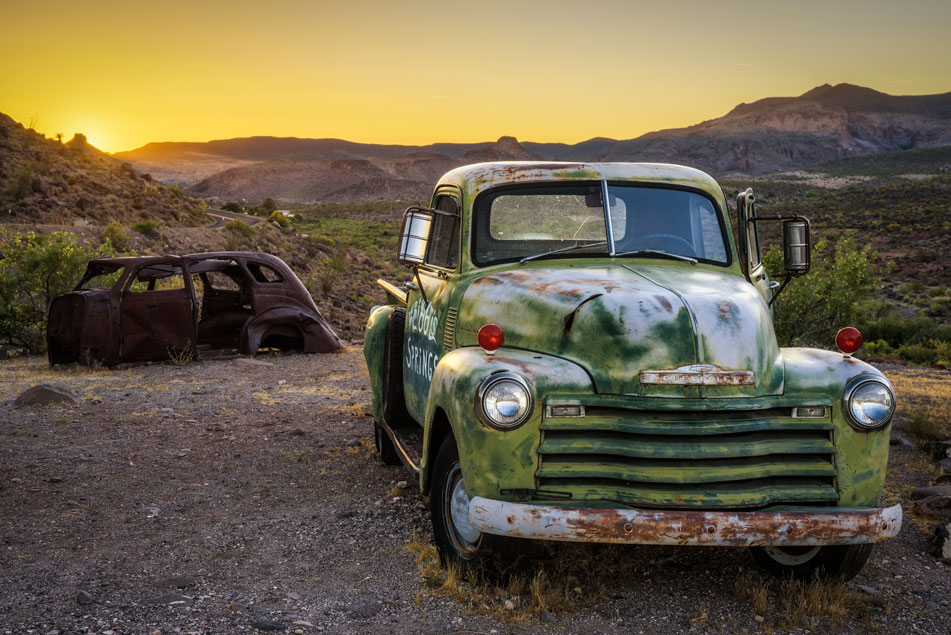
Next stop is Mt. Olive, and the Soulsby's gas station. Open from 1926 until the early 90s this was one of the longest operating gas stations on the old Mother Road. Henry Soulsby built it in order to have a business to pass on to his son Russell, and the landmark filling station would continue pumping gas for another fifty years after the Route 66 designation had been removed from the pavement outside. Russell Soulsby was trained in the Army as an electronics repairman and used the north side of the station to run a second business - of servicing the community's radios and televisions.
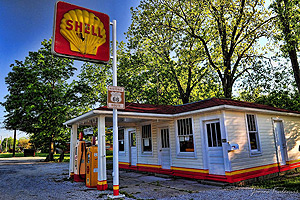
Along with the bright reds and yellows of the recent restoration, the most striking feature of Soulsby's Station is on the south side of the property where the repair rack shares space - quite intimately - with an old oak tree. With no room inside for automobile service, repairs were all made on the steel ramp outside. Over the years a tree began to spring up between the tire rails on the rack. It’s still there, rising up out of the middle, preventing modern automobiles from venturing up onto it. This Mount Olive landmark gives Route 66 another signature quirk.
Next stop is the Country Classic Cars - a dealer that has about 600 classic cars for sale in sheds we can visit. This sight is too much to absorb...
Staunton has another special treat for true Route 66 aficionados. We can't pass through Staunton without a stop at Henry's Rabbit Ranch. Look out for the bright "Hare It Is" sign located on the old 1930 - 1940 alignment of Route 66. This sign is actually a riff on the renowned "Here It Is" sign at the Jackrabbit Trading Post on Old Route 66 in Arizona.
The Chain of Rocks Bridge was, for a time, the path used by Route 66 to cross over the Mississippi river, carried Route 66 traffic across the Mississippi from Illinois to Missouri from 1929 through 1967. It’s most notable feature is the 22-degree bend occurring at the middle. This peculiarity was necessary to establish sound footings in the treacherous channel. The bridge now only carries walking and biking trails over the river.
CORB was added to the National Register of Historic Places in 2006.
Day 4 - Tuesday, September 16, 2025 - miles: 247, kilometers: 397
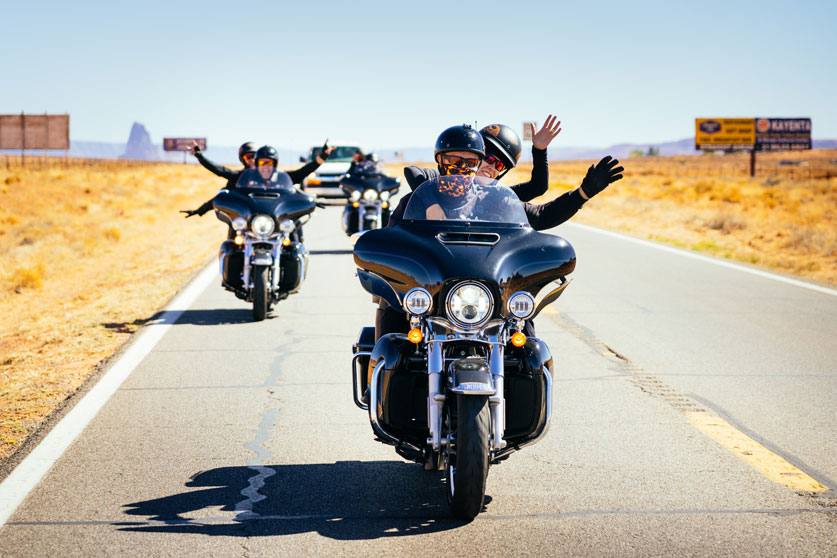
Today we will not only ride on Route 66's finest roads, but stop at the Fanning 66 Outpost. Stocked with a goodly selection of Route 66 souvenirs and collectibles including a taxidermy shop, archery range and the world’s largest rocking chair, according to the Guinness Book of Records. At 46 inches tall and weighing some 26,500 pounds it could hardly be anything else!
Devil’s Elbow is a famous or should we say infamous stretch of Missouri Route 66 legend - and the Big Cut area of the Mother Road. It used to be considered one of the most dangerous sections of old Route 66. Today it is an agreeable break in a pleasant, park-like setting.
Devil's Elbow was a popular resort town in the 1930s and 40s. With the picturesque Big Piney River’s and the beautiful Ozark Hills as a backdrop it’s easy to see why.
Day 5 - Wednesday, September 17, 2025 - miles: 202, kilometers: 325
We visit "Gay Parita Service Station" first thing in the morning. This is a must stop in a wonderful world of Route 66 attractions. We could easily spend hours just going through all the treasures there.
Welcome to Kansas! Kansas has got the shortest stretch of Route 66 asphalt: only 13 beautiful miles. In Galena there is a chance we meet "Tow Mater" from the movie CARS – the original 1951 International boom truck next to the old garage on the old Route 66 where we have lunch.
On our way to Baxter Springs, Kansas and just few miles west of Riverton we come to the Marsh Arch "Rainbow Bridge" on the old alignment of Route 66. This is one elegant old bridge, though it is far smaller than the old Spring River Bridge, which did not survive the "new is better" ethos so evident during the 1970s and 80s.
As we ride through Miami (and we are starving) we won’t miss Waylan’s Ku-Ku Burger with its giant Cuckoo Clock outside. This little fast food restaurant with a cuckoo bird popping out of its cuckoo clock roof has been a Route 66 icon for decades.
Then, listed on the National Register of Historic Places, the appropriately named Totem Pole Park is home to the World’s Largest Concrete Totem Pole, a 90 foot totem pole that towers over the park in an astonishing array of folk art colors, with the four nine-foot Indians near the top each representing a different tribe.
Between 1937 and 1948, one Ed Galloway built the totem pole utilizing some 28 tons of cement, six tons of steel, and 100 tons of sand and rock. Ed’s personal tribute to the American Indian features a collection of some 200 carved pictures.

Day 6 - Thursday, September 18, 2025 - miles: 217, kilometers: 350
We begin the Ozark Trail section by crossing over Rock Creek, an iron bridge with a brick deck from 1925; passing by a real relic of Americana, a defunct drive-in movie theater, and then hang onto the curves through a narrow RR subway.
Seaba Filling Station: listed on the National Register of Historic Places, this Route 66 landmark is now filled with over 65 vintage motorcycles from 1908 to present. The Seaba Station was built in 1921, five years before historic Route 66 was certified as a national highway. Let us pay a visit to browse through motorcycle displays, antiques, souvenirs and more.
At Arcadia, Travelers frequently pause to consider the statue of Washington Irving, and all his works and deeds. Then there’s the iconic Round Barn, according to many the most photographed spot of all on Route 66. These days there is yet another reason to stop in Arcadia: POP'S, a somewhat futuristic looking restaurant on Route 66 that’s bound to become one of the many instantly recognizable landmarks on "America’s Main Street"!
The National Cowboy & Western Heritage Museum on Oklahoma City features a superb collection of classic and contemporary western art. The exhibition wing houses a turn-of-the-century town and interactive history galleries that focus on the American cowboy, rodeos, Native American culture, Victorian firearms, frontier military and western performers.
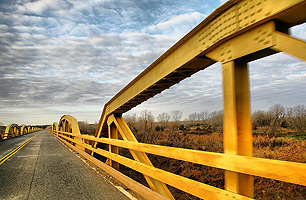
We continue our trip West reaching the interestingly named South Canadian River and the 38-arch bridge which traverses it. This bridge was indeed constructed using 38 low-rise truss arches, some 19 on each side. These arches are also known as "ponies": they are painted yellow and visible from some distance. Take a quick look at our little video of crossing the bridge, which happens to be gateway to one of the most pleasant drives on all of Route 66. It’s here you get the authentic feeling that comes from riding on a two-lane cement road which hugs the very contours of the earth, and rises and falls gently with the hills. Going down this road you get a sense of what it must’ve been like crossing Route 66 back in the 1930s ... except that you're almost certainly going much faster than they did back then!
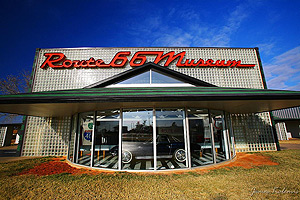
The seams in the cement reverberate with a gentle rhythm on the ride up to the Oklahoma Route 66 Museum. Largely due to Jim Ross and Shellee Graham's many fine Route 66 photographs, probably this is the best out of the many museums on Route 66.
Day 7 - Friday, September 19, 2025 - miles: 193, kilometers: 311
As befits its name, The National Route 66 Museum in Eric celebrates Route 66, not just in the state of Oklahoma, but all eight Route 66 states. The museum features a walk through scale model of all eight states focusing on the ordinary folk who lived, worked and traveled the old Mother Road. The murals are quite realistic and the exhibits include vintage automobiles and antiques from the bygone hey-day of Route 66.

Erick OK
There was a time when everything west of Eric was considered to be the "Great American Desert". This is also explained by the fact that until it was realigned, Erick used to be right on the Texas border.
We go just one block south of Roger Miller Boulevard and check Bonebrake Hardware "Museum". In the 1960s the owners retired: just locked the doors for the night and left. Nobody has ever seen them after. Today you can look in the store windows to see dusty counters and inventory, otherwise unchanged.
There was a time, the 1930s to be precise, when Shamrock was a prosperous oil town. A conspicuous reminder that the old Route 66 ran through Shamrock, is the Tower Service Station and U-Drop Inn Conoco, since 1936 it’s been a Texas Route 66 milestone. The U-Drop Inn Cafe, named by a local schoolboy in a contest that awarded him $50.00 for his idea. To this day, it is still one of the most upscale eateries on U.S. Highway 66 between Oklahoma City and Amarillo.
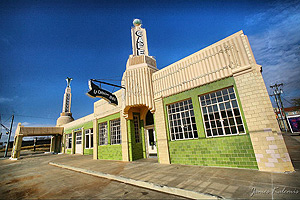
Oozing old time atmosphere, the small Panhandle town of McLean is a trip back in time to a true Route 66 experience.
McLean’s Devil's Rope Museum is dedicated to barbed wire, or the Devil's rope as it’s sometimes called around these parts. The Museum features the history of barbed wire, and artifacts which are a reminder of the significance of this invention, and its impact on the Old West’s development.
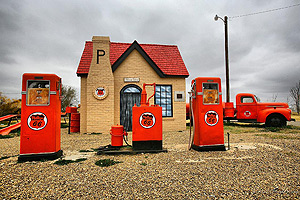
The restored Phillips 66 Gas Station – Now this is truly history. Not only was it the first Phillips 66 Service Station in Texas, built as it was in 1927, but the gas pumps show the price of gas at a mere 19¢ a gallon!
On we ride, to another historic railroad town, this one dating back to 1902, Groom, Texas. Arguably its chief attraction is the neck-turning "Leaning Tower of Texas" actually just a water tank tipping perilously to one side. One leg of the Britten USA water reservoir is actually shorter than the others. It was built this way just to catch the tourist's eye and get them to stop for a while in Groom. Another attraction for the Interstate traveler is the Groom Cross. With a height of 190 feet, the Groom Cross is reported as being the 2nd biggest cross in the northern hemisphere. Built on private property it is visible for miles as you approach this panhandle town. Though it doesn't date back to the very first days of Route 66 it’s definitely in the spirit of the old Mother Road.
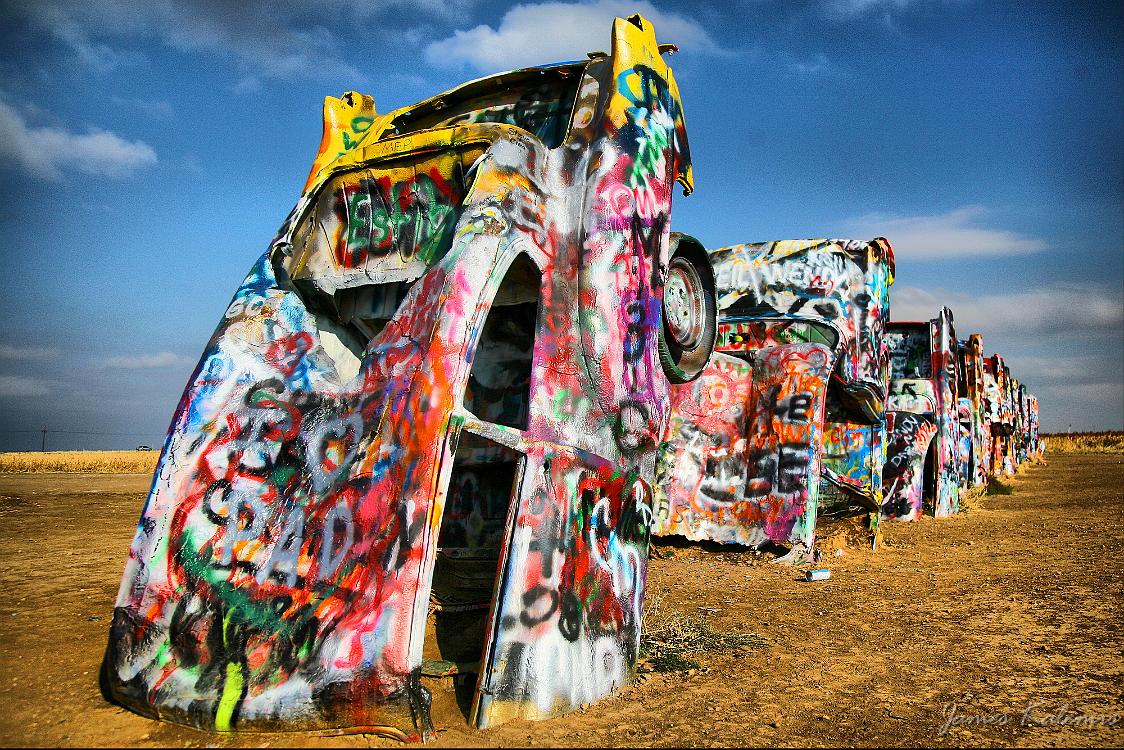
Then, you can’t miss them and why would you want to? We mean ten graffiti-covered cars that are half-buried, nose-down and rise up out the desert terrain, and collectively known as The Cadillac Ranch. Built in 1974 by Stanley Marsh and The Ant Farm, a San Francisco Art Collective, the ranch is located along the fringes of historic Route 66 facing west "at the same angle as the Cheops' pyramids." The Cadillacs are all emblematic of the "Golden Age" in American Automobiles (1949 through 1963). The line-up of cars and their position all the way out in a field allows for some atmospheric photography. Their distance from any watchful eye of authority also encourages ever-changing layers of painted graffiti, which Marsh has never had much of a problem with. Interesting to note however, that in 1997 encroaching development forced Marsh to pick up and move the whole Caddy farm that much further West.
When Amarillo and the 66 come to mind, one of the first places you probably think of would be the Big Texan Steak Ranch, and if not, it should be. Open since 1960, The Big Texan has become world-renowned for its 72oz steak eating challenge. If you can eat a shrimp cocktail, salad, baked potato with fixin's, and a 72oz steak (about 2 kg) within 60 minutes your meal is free! But if you can’t quite make it, you’ll have to foot a bill of around $70 plus tip. Only around 1 in 6 customers are successful, according to the Big Texan website.
Day 8 - Saturday, September 20, 2025 - miles: 301, kilometers: 485
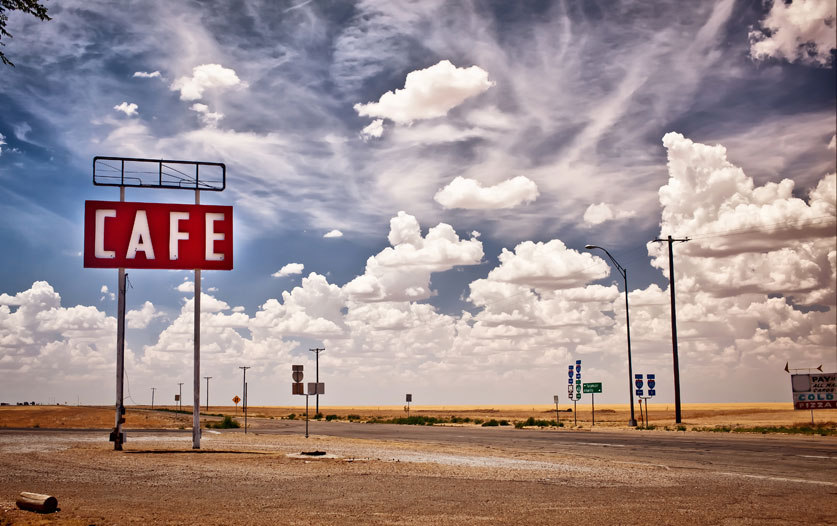
We have officially reached the halfway mark when we arrive at the town of Adrian, Texas. This little Route 66 town’s claim to fame is that it’s the midpoint of the 2,278 miles between Chicago, IL and Santa Monica, CA. Some pictures under the halfway sign are a photo opportunity too good to miss.
On the border of Texas and New Mexico we visit the "Ghost Town" of Glenrio built in 1926. Current population now is 2.
Onto to New Mexico and a full day of both riding and sightseeing, we ride through Tucumcari, where the neon lights of the archetypal motel The Blue Swallow have been a beacon for road weary travelers since 1939. Lunch at a Mexican restaurant fortifies us for the afternoon in Tucumcari
Day 9 - Sunday, September 21, 2025 - Rest day!
A well deserved break! It is time for a little rest now and Santa Fe is a perfect spot. You can do the laundry, visit the many galleries and art exhibitions or just relax by the pool!
Day 10 - Monday, September 22, 2025 - miles: 176, kilometers: 238
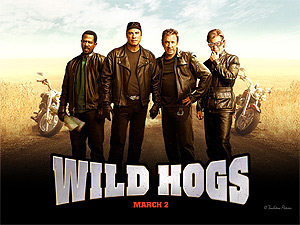
When Wild Hogs came to Madrid... If you have always been curious about what it would be like to be living in the midst of a major movie production while it’s being shot, than this site should be right up your street. It chronicles the shoot of the Disney movie Wild Hogs as it in took place in Madrid, New Mexico. The film is about ageing suburban bikers who face down a serious gang and starred John Travolta and Tim Allen. For an entirely different kind of experience, it’s interesting to note that Madrid and the area surrounding it, is reputed to be haunted. There has been many a ghost sighting around the town, in the old church and the cemetery, but perhaps most of all the Mine Shaft Tavern. Both guests and staff have reported seeing doors pushed open by unseen hands, doors that then swing eerily in the breeze. Glasses fall from shelves and smash on the floor, mysterious sounds are heard through the six inch abode walls, furniture is moved about in the middle of the night, and perhaps strangest of all, employees at the Mine Shaft tell of looking in the mirror to see a ghost staring back at them. Spooky!
Next stop is The 66 Diner which looks, feels and even tastes like a Mother Road classic. Uniformed waitresses work the dining area to the beat of 1950s era rock-and-roll blasting from an old time juke box. Bright red ceiling lamps are suspended over aqua-blue counter stools. There’s a hopscotch game built into the black and white tiled floor. But best of all you can chow down on traditional Route 66 roadside fare. Try their hamburger or a sloppy Joe with French fries and a world beater milk shake, or a pounded-tender chicken-fried steak coated in gravy with a side of mashed potatoes. Check out their daily blue-plate specials, such as Tuesday’s chicken pot pie and Saturday’s hot turkey sandwiches.
A little further west and we arrive at Grants, where we overnight.
Day 11 - Tuesday, September 23, 2025 - miles: 211, kilometers: 340
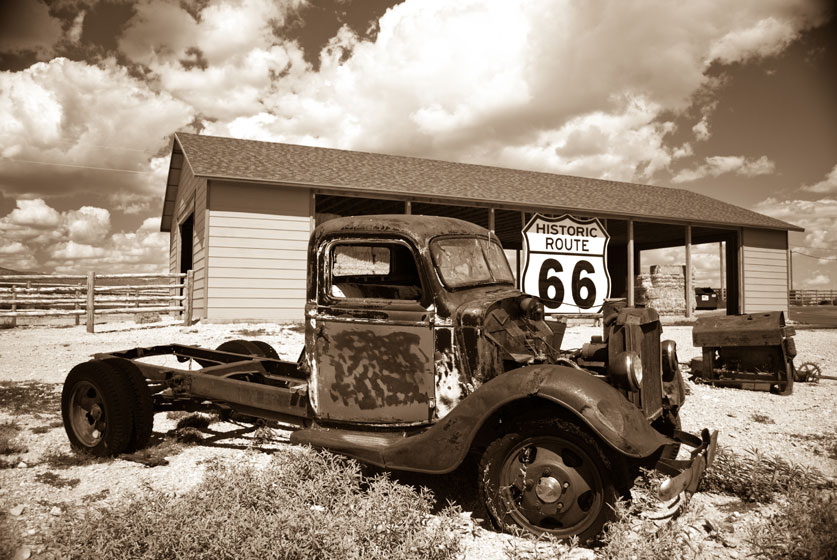
Let’s check out a real slice of the Old West, Hollywood style. Gallup's El Rancho Hotel was built in 1937 on historic Route 66, and is now protected and cared for by preservationists. Well, back in the olden days of the Western, the Gallup rented rooms to literally 1000s of movie stars while they were in town making movies. And it sure looks the part, with its sweeping staircase and huge stone fireplace, plus old Hollywood star portraits and Navajo art filling the two story lobby of this rustic hotel. There’s also a fine selection of Southwestern and Mexican cuisine available in the "Old West" 49er Lounge.
If it’s Native American pottery, baskets, beaded items, artifacts you’re after, you will certainly find them at Richardson's Trading Company located in Gallup’s downtown area. It’s a great place to select some one-of-a-kind Native American artwork.
Some of the most outstanding geologic and fossil records of the Late Triassic period anywhere can be found at our next destination, Petrified Forest National Park. Driving through the park takes all of 45 minutes but if the riders are keen, we can stay a little longer for a prehistoric history lesson. Research conducted in the park turns up new evidence all the time, ranging from petrified wood to dinosaur bones.
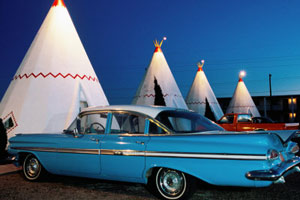
Old time trading posts and motels straight out of 1950s Americana still line Route 66 in Holbrook. The area around Holbrook is a nirvana for rock hounds, as the so-called Painted Desert is still fertile ground for discovering dinosaur remains. Tonight’s accommodation is something special, for we sleep in a wigwam at the Wigwam Motel, where don’t worry, the tents are complete with the amenities for a comfortable stay.
Day 12 - Wednesday, September 24, 2025 - miles: 106, kilometers: 171
There are of course many attractions along Route 66, some of which might best be described as curiosities. We can’t stop for all of them, but who could resist the charms of a 10 foot high jackrabbit with a saddle across its back? This is a great, tongue-in-cheek photo opportunity. There’s not much else to do at this spot on the I-40 in the middle of the desert, aside from a visit to the Jack Rabbit Trading Post that is.
It’s certainly curious that despite being in the proverbial middle of nowhere, the Jack Rabbit Trading Post has its own on and off ramps for I-40. The story behind them is this: Back in 1967 an Arizona state senator named Glenn Blansett purchased the Trading Post. One of his last acts as a Senator was to see that the I-40 ramps were put in place here. The Jack Rabbit Trading Post is still in the Blansett family, but these days it’s his granddaughter Cindy who runs the show.
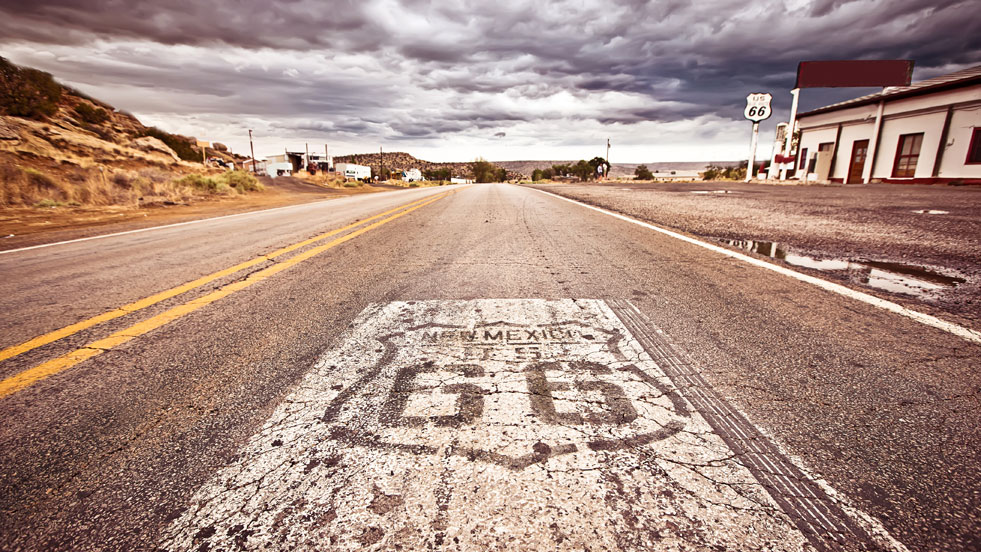
You may wonder how these far flung trading outposts ever attracted customers, especially in the days before the mass communications. Typically the owners of these establishments would take a road trip themselves, all 1,000 miles to Springfield, MO. On the way back, they dotted the roadside with billboards. The cumulative effect was such that by the time travelers arrived at a place like Joseph City their curiosity was so piqued they couldn't help but stop. Pioneers in their own way, the proprietors brought customers to their stores, and didn’t let being "in the middle of nowhere" stand in their way. Good for them.
Up until the 1960s, Winslow was the biggest town in northern Arizona, but it’s a familiar story, when the town was bypassed by the I-40 in the 1970s, shops and businesses began closing down and the population declined. In 1972 however, "Take it Easy", the first hit single for those California rockers The Eagles came out, and immortalized the town in pop/rock consciousness with the lyric, "standing on a corner in Winslow, Arizona".
About six miles south of I-40 exit 233 and three miles east of the evocatively named Two Guns we arrive at Meteor Crater, another one of Arizona’s remarkable holes in the ground. It’s the result of an asteroid crashing to earth at a speed of 26,000 miles, some 50,000 years ago. Some 550 feet deep and almost a mile in diameter, these days the crater is actually a privately owned tourist attraction. Its "Astronauts Hall of Fame" plays up the crater’s likeness to the moon, not without justification when you learn that Apollo astronauts used to practice their moon-walk at Meteor Crater.
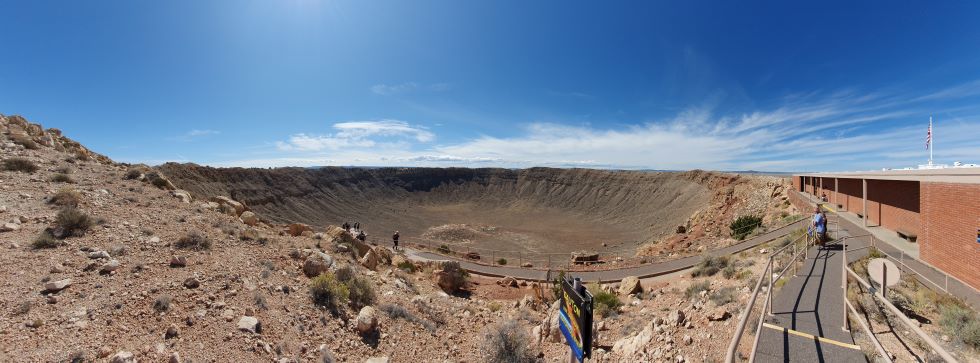
We ride on through the dense forestland southeast of Flagstaff, passing by the small seasonal stream of Walnut Creek, which over 1000s of years has engraved a 600 foot deep canyon into the local Kaibab limestone. As it flows east, it eventually joins with the Little Colorado River en route to the Grand Canyon. Over time, shallow caves were formed in the canyon walls. Way back in the 12th to 13th centuries the Sinagua Indians constructed many cave-dwellings high above the canyon floor, along the steep, easily defensible ledges.
Day 13 - Thursday, September 25, 2025 - miles: 161, kilometers: 259
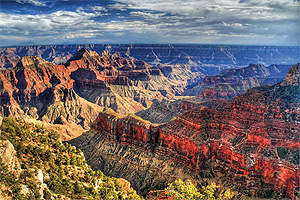
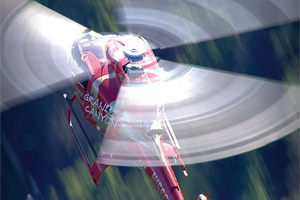
However sky-high your expectations, there’s nothing that really prepares you for the awesome reality of The Grand Canyon. There’s something humbling and transcendent about seeing it for the first time. You will be overawed by both its beauty and size. Its great age stands in stark relief to our relatively short time on Earth, and in its vast space, travelers can seek a respite from hectic 21st century life.
This enormous chasm was etched into the Colorado Plateau landscape over several millennia. Today it is enjoyed by those who come to explore its roads, hike its trails, or brave the Colorado River’s surging currents.
We will book a helicopter flight over the Grand Canyon, and experience the world famous IMAX movie Grand Canyon: 'The Hidden Secrets' at the park entrance.
Overnight in the town of Williams, with its quant downtown which is on the National Register of Historic Places. To this day, Williams the town is a perfectly preserved piece of small-town America, with its virtually unchanged main street and what’s more, a kind of small town life you just don’t find much anymore. They still hold a local beauty pageant in Williams, and store clerks will happily give you tips on where best to eat.
Day 14 - Friday, September 26, 2025 - miles: 194, kilometers: 311
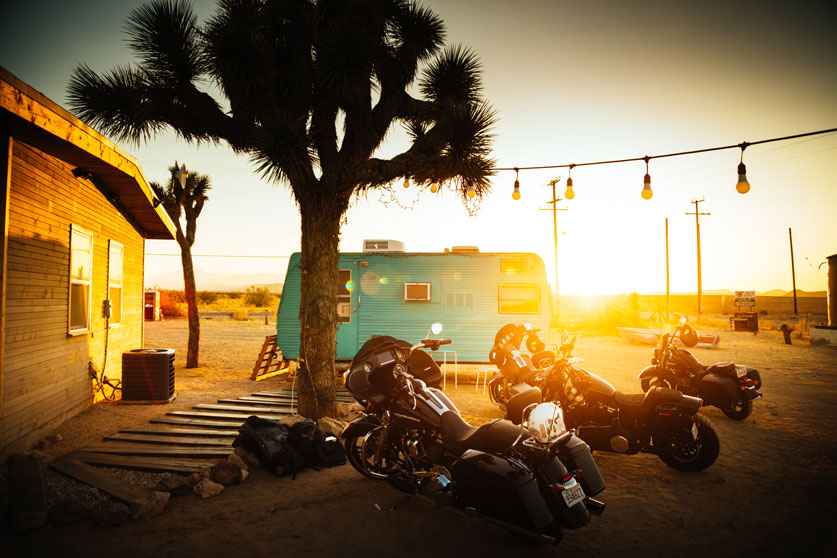
As Route 66’s place in American history becomes the subject of ever more interest, Ash Fork’s place on the map seems assured. With all the stone quarries surrounding it, Ash Fork bills itself as "The Flagstone Capital of the World", It is also starting point for Crookton Road, which has the distinction of being one of the longest stretches of unbroken Route 66 highway in existence today.
Eventually we arrive to Seligman, which is a great little town, with clean streets and friendly people. There are, it has to be said, gift shops galore, most of them focused on Route 66 and American memorabilia, but there’s also a fine selection of biking clothing and accessories such as boots and leather jackets. Out on the street, there are vintage cars, colorfully dressed mannequins, and funny little street signs galore. We make a stop for a hearty breakfast at Frank's place. As you’ll see, it’s a one of a kind.
Grand Canyon Caverns have been a must-see Route 66 tourist spot ever since the 1930s. A maze of limestone caves some 21 stories underground that wend their way all the way to the Grand Canyon, these caverns were formed over the course of 35 million years. You could fit 3 football fields inside the parts of the caverns where we can take our tour.
On a smaller scale but interesting in its own way, is the old gas station at Hackberry. This former gas station and general store doesn't sell gas these days, but it does sell practically anything and everything associated with Old Route 66. Run by John and Kerry Pritchard, we recommend a walk behind the store, where they keep the really interesting memorabilia. That means old cars, sheds, garages, cactus, signs and more than we can list here. You can even take a carrot or two and feed the mules beyond the water garden.
Then if you like root beer, may we recommend Mr. D’z Kingman Route 66 Diner, proudly serving the finest root beer in the world. Root beer is in fact a kind of soda.
Beginning at the town of Kingman, Oatman Road is a winding two-lane road traversing 42 miles of Arizona's striking desert terrain. In combination with the byway's stirring Western history, the scenery creates an atmosphere that is unmistakably "Old West". In the surprisingly lively ghost town of Oatman, we’ll come across free-roaming burros (wild donkeys), the occasional gunfight (staged for your enjoyment), and a collection of scenic storefronts straight out of an old John Wayne movie.
Day 15 - Saturday, September 27, 2025 - miles: 215, kilometers: 354
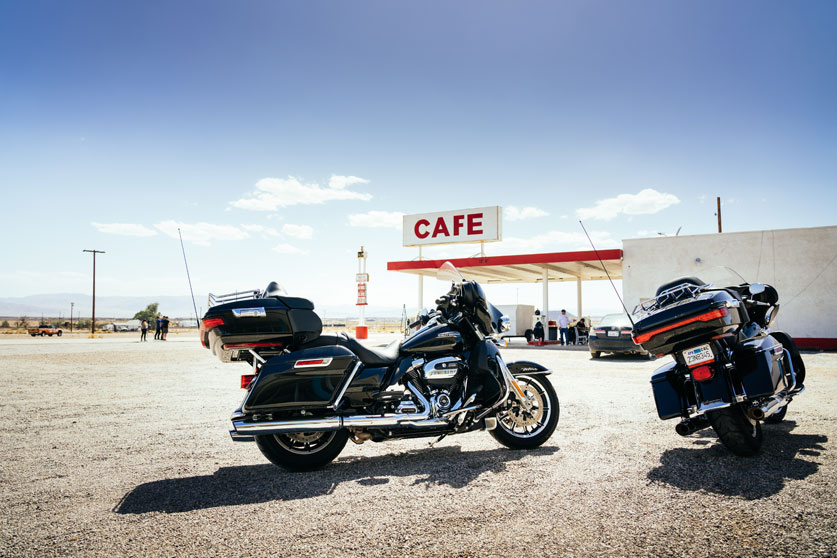
In the Mojave desert on Historic Route 66 we arrive at Roy’s in the town of Amboy, California. Roy's Motel/Café and its gas stop is about as iconic a lonely desert stop can get, partly because of its many appearances in movies. You could say the town of Amboy has it all: its own airport, garage, school, church and graveyard - and even a volcanic crater. Everything but a post office, so don’t expect to send any postcards from Amboy.
Bottle farm: Elmer has filled his yard with sculptures that resemble trees covered with bottles. They're actually pieces of pipe welded together, with hundreds of bottles loosely slipped over the ends so that they tinkle in the wind. There are lots of other odds and ends mixed in, including old signs, wheels, mechanical junk, all in all: a great stop, again!
Day 16 - Sunday, September 28, 2025 - miles: 114, kilometers: 183
On a palm-lined cliff at the edge of the Pacific Ocean in Santa Monica, only a few blocks away from the city’s landmark pier, old Route 66 came to its western terminus. The pier supports a small amusement park and a charmingly quaint carousel.
There’s a beach-front walkway which goes from the pier to Venice Beach, the heart of hippy trippy L.A. But keep your eyes peeled, for right where Santa Monica Boulevard dead-ends at Ocean Boulevard, there’s a brass plaque which denotes the official end of the "Main Street of America".
Your Route 66 tour finishes right on Santa Monica Pier under the sign "End of the Trail". It’s time to return the vehicles and stay the last night in LA. Soon you are on your way back home, unless you'd like to visit Las Vegas or spend a few more days in California in which case just let us know so we can arrange extended bike hire and accommodation.
Day 17 - Monday, September 29, 2025 - Los Angeles (California)
Departure day. Please note: you can take a flight home the previous evening, in this case the last night hotel accommodation is reimbursed to you.
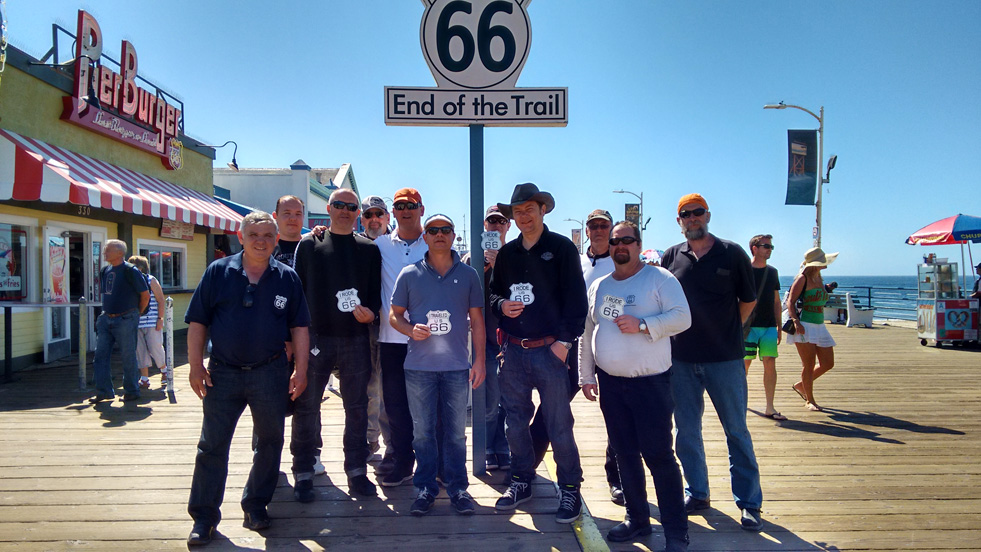
Reverse route notice:
We suggest the following route if you start in Los Angeles:
Option 1
Day 1: drive to Barstow (121 miles)
Day 2: drive to Las Vegas (154 miles) on Hgw 15 or take the old Route 66
Option 2
Drive to Las Vegas during day 1 and stay 2 nights there
Take Hwy #15 (273 miles) or drive the longer old Route 66 (365 miles)
Option 3
Not going to Las Vegas?
Drive to Barstow (121 miles) and then Laughlin on old route 66 (190 miles)
Tour dates:
 Sep 13, 2025 - Sep 29, 2025
Sep 13, 2025 - Sep 29, 2025
Get your own travel/medical/health/trip cancellation insurance! Book online!
Rates for Small Group Guided Tours (per person):
1 rider 1 motorcycle 1 room: US$11,500.00 (£9,085.00, AU$18,400.00, NZ$20,355.00, 11.040,00 €)
2 people 1 motorcycle 1 room, per person: US$5,635.00 (£4,452.00, AU$9,016.00, NZ$9,974.00, 5.410,00 €)
2 people 2 motorcycles 1 room, per person: US$9,200.00 (£7,268.00, AU$14,720.00, NZ$16,284.00, 8.832,00 €)
The rate includes the following model rentals:
- Harley-Davidson® Street Glide®
- Harley-Davidson® Road Glide®
- Harley-Davidson® Heritage Softail® Classic
- Yamaha® Super Tenere 1200
Please add $200 for following model rentals:
- Harley-Davidson® Street Glide® Touring Edition
- Harley-Davidson® Road Glide® Touring Edition
- BMW® R 1250 GS
- BMW R 1250 RT
Please add $550 for following model rentals:
Various motorcycle insurances are available that you can book with your rental, for more information please have a look at our Insurance webpage.
It is possible to join the tour with a convertible or other rental car categories:
‘full size’ category, like Nissan Altima or similar from US$7,748.00 (one or two people)
+ Chicago - Los Angeles one-way fee: from US$650.00 (approximately)
‘SUV’ category, like Jeep Grand Cherokee or similar from US$7,898.00 (one or two people)
+ Chicago - Los Angeles one-way fee: from US$650.00 (approximately)
‘convertible’ category, like Ford Mustang or similar from US$8,423.00 (one or two people)
+ Chicago - Los Angeles one-way fee: from US$650.00 (approximately)
Tour fee includes car rental with insurance + 1 room and all the other inclusions as motorcycle riders. Extended roadside assistance is optional and can be booked online by driver (approx. US$8.00 per day). The one-way fee must be paid by driver in Chicago. Gas is not included for cars on any tours.
Pre-tour hotel nights in Chicago: from $230 (depending on dates)
Post-tour hotel nights in Los Angeles: from $180 (depending on dates)
Cancellation
Guided tours
The tour is definite-go when 2 riders are booked.
45 days or greater cancellation notice: Security deposit is not refundable, can be used next riding year as tour credit.
Cancellations received less than 45 days prior to the tour departure date will be subject to the following penalties:
44-32 days cancellation notice: Up to 50% loss of total Tour Fee to cover hotel & other costs. Rental Voucher for the remaining amount for future travel.
31 days or less: Up to 100% loss of total Tour Fee. Rental Voucher for any remaining value for future travel.
Because of the chance of illness, accident, airline inefficiency, company insolvency or other unforeseen situations that may cause a customer (you) to miss a tour, we suggests to purchase travel/medical/health/trip cancellation insurance. It is a little expense that gives you piece of mind, highly recommended!
Self-guide tours
Self-guide tours with motorcycle rental:
- 31 days or greater cancellation notice: No charge, security deposit is (20%) non-refundable, but can be used as store credit.
- Cancelling between 30-21 out from your tour start date will have a 33% cancellation fee and the remainder will be put into store credit.
- Cancelling between 20-11 out from your tour start date will have a 66% cancellation fee and the remainder will be put into store credit.
- Cancelling inside of 10 days would forfeit everything as a cancellation fee.
- Refunds, if applicable, will be issued in a form of store credit that can be redeemed within 1 year from the date it was issued.
- Cancellation/Change Fees: Fees are based on Total Booking Amount (Daily rental rate + VIP/VIP Zero, Taxes & Fees).
- Payments: Deposits are non-refundable, some payments in the event of cancellation can be used as store credit.
- Any and all balances remaining after Cancellation Fees have been applied will be issued in the form of a Store Credit that may be redeemed within one year.
Self-guide tours with car rental:
- 14 day or greater cancellation notice: no charge, fees are to be refunded
- 14 day or less cancellation notice: 100% of Total Booking Amount
Insurance
Please see our insurance options on the Insurance page.
What is included in the Small Group Guided Tour?
- Harley-Davidson motorcycle rental
- One-way fee for motorcycles
- Professional tour guide
- Tour day-to-day itinerary
- Baggage transportation in a car
- Fuel and oil
- National park entrance fees
- Museum and other attraction tickets (Route 66 Interpretive Center, National Cowboy & Western Heritage Museum, Route 66 Museum, National Route 66 Museum, Meteor Crater, IMAX Grand Canyon, Grand Canyon Caverns)
- Welcome & farewell dinner
- Transfer from hotel to motorcycle rental office
- Roadside assistance
- Helmet (half-face)
- Unlimited mileage
- Toll fees
- 17 tour days, 16 night accommodation in double room, riding days: 15
- Taxes
What's not included in guided tours?
- Airfares to/from Chicago and Los Angeles
- Insurance
- 25 minute helicopter flight over the Grand Canyon (optional program, @$286 per person)
- Health, motorcycle damage, travel/medical/health/trip cancellation insurance (optional)
- Food and snacks (except for welcome & farewell meals)
- Beverages
- Motorcycle trailer (we have got roadside assistance)
- Gas, car insurance, car one-way fee (if you rent a car on this trip)
- Rain-gear
- Personal souvenirs
- Transfer airport to hotel in Chicago
- Parking fees (passenger cars only)
- Tour to Milwaukee to visit the Harley-Davidson museum - optional program, can be arranged at request
- Tips
What is included in the self-guided version?
- Harley-Davidson motorcycle rental
- One-way fee for motorcycles
- Tour day-to-day itinerary
- 48 page sights and attractions database (pdf file)
- Route 66 navigation app on your smart-phone
- Unlimited mileage
- Helmet (half-face)
- 17 tour days, 16 night accommodation in double room, riding days: 15
What's not included in self-guided tours?
- Airfares to/from Chicago and Los Angeles
- Insurance
- 25 minute helicopter flight over the Grand Canyon (optional program, @$286 per person)
- Food and snacks
- Beverages
- Fuel and oil
- Entry tickets to museums and attractions (optional)
- Tips
- Personal souvenirs
- Parking fees, park entrance fees, road or toll charges
- Seasonal surcharges
- Roadside assistance
- Rally surcharges
- Transfer airport-hotel-airport
- Tour to Milwaukee to visit the Harley-Davidson museum - optional program, can be arranged at request
- Rain-gear
What is the difference between the "Small Group" and "Standard" Route 66 tours?
- Small Group tour offers visiting Harley-Davidson Factory and Museum in Milwaukee (optional program)
- Small Group tour takes it easy: we ride 2 more days on road!
- Small Group tour has limited motorcycles on tours, no more than 12
- Small Group tour rides more 2 lane old roads, in fact everywhere it is possible
- Small Group tour visits a lot more stops and attractions (small groups are always easier to handle)
- Small Group tour participants spend more time at each sight or attraction
- Small Group tour rides in September with the most pleasant weather possible in season (there was no rain in 2015, little rain in 2016, some thunderstorm in 2017, little rain in 2018/2019/2022/2023)
- Small Group tour has easier day-to-day distances
- Small Group tour arrives to Los Angeles on Sunday to avoid horrible traffic
- Standard Tour: Tour days: 15, Nights: 14, Riding days: 13
- Small Group Tour: Tour days: 17, Nights: 16, Riding days: 15
- Standard Tour: all rooms are in hotels
- Small Group Tour: 14 nights in hotels, 2 nights in historic motels (Wigwam Motel Holbrook AZ and Railhaven in Springfield MO - once Elvis stayed here, too!)
- Standard Tour - meals: 2 meals (welcome and farewell dinner - soft drinks) are included + breakfast at all hotels
- Small Group Tour - meals: 2 meals (welcome and farewell dinner - soft drinks) are included + breakfast at most locations (we have to walk across the road to a Cafe at the Wigwam, no breakfast there)
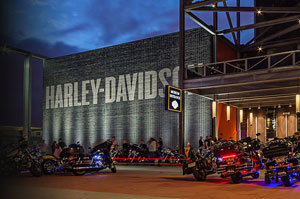
HARLEY-DAVIDSON MUSEUM: WHAT DO YOU FIND HERE?
- Over 450 motorcycles and artifacts, dating back to Serial Number One, the oldest known Harley-Davidson® motorcycle
- Stories of extraordinary products, people, history, and Harley-Davidson culture
- Never-before-seen Archives that you can tour
- A world-class Museum space and outlying buildings, designed by Pentagram Architects
- Unique Harley-Davidson Museum-inspired gifts at The Shop
- Distinctive dining at MOTOR® – no Museum admission required
** Las Vegas
We understand Las Vegas is fun, however, the extreme heat makes motorcycle riding dangerous and irresponsible. Safety first, we do not ride into Las Vegas, but of course - you can enjoy the Sin City on your own after our tour is finished.
Motorcycle Insurance
No Damage Waiver (no insurance)
- Damage to Motorcycle: Renter pays full retail value of ALL damages, no matter who's fault the damage was.
- Theft of Motorcycle: Renter pays full retail value of motorcycle.
- Breakdown Protection: Refund of daily rental rate or a portion thereof.
- Flat Tire Coverage: Not Included.
- Security deposit: $5,000 on all rentals.
- Cost: $0.00 / Day.
LDW (Loss/Theft & Damage Waiver)
- Theft of Motorcycle: $5,000 deductible per occurrence. Covers Theft of Motorcycle and motorcycle accessories provided motorcycle was locked with all locks supplied from us. Does NOT include personal belongings left on motorcycle or in saddlebags. $2.500 deductible. Renter pays Up to $5,000 per occurrence.
- Damage to Motorcycle: Up to $2,500 per occurrence. covers any and all accidental; non-negligent, damage to motorcycle and motorcycle accessories.
- Personal Property Loss Protection: Not included.
- Additional Driver - Not included.
- Flat Tire Coverage - Not included.
- Security deposit: $750.
- Cost: $29.00 / Day.
LDW Zero (Loss/Theft & Damage Waiver)
- Theft of Motorcycle: $1,000 deductible per occurrence. Covers Theft of Motorcycle and motorcycle accessories provided motorcycle was locked with all locks supplied from us. Does NOT include personal belongings left on motorcycle or in saddlebags. $1.000 deductible. Renter pays Up to $1.000 per occurrence.
- Damage to Motorcycle: $0 per occurrence. covers any and all accidental; non-neg ligent, damage to motorcycle and motorcycle accessories. Renter pays $0.
- Personal Property Loss Protection: Not included.
- Additional Driver - Not included.
- Flat Tire Coverage - Covers tire repair/labor. Towing is covered up to $100 per occurrence
- Security deposit: $100.
- Cost: $39.00 / Day.
Supplemental Liability Insurance (SLI), $29.00 per day Insurance protects renter against claims made by a third party for bodily injury and/or property damage sustained as a result of an accident up to $300,000.
ROADSIDE ASSISTANCE
Roadside Assistance Coverage $12.50 USD plus tax provides towing and roadside assistance by a approved vendor if your motorcycle becomes inoperable. The benefits include emergency road service towing (within 30 miles of occurrence) emergency fuel delivery (up to 2 gallons) and jump start services. In purchasing the Roadside Assistance Coverage, we will waive the cost of any approved tow or road side assistance service unlimited.
Security Deposit: The Security Deposit is an ‘Authorization Only’ onto a major credit card meaning the funds must be available for hold but is not processed against your account unless required per Terms and Conditions of Rental Agreement.
All Theft and Damage Waivers and Supplemental Liability Insurance options are subject to the express terms and conditions of the rental contract and do not include coverage for injury, personal property, or damage as the result of negligence such as illegal use or use of rental while under the influence of drugs or alcohol. A Police Report is required for all damages or accidents. All damages to rented motorcycle without a police report will be considered to be at the fault of the Renter.
Supplemental Liability Insurance provides supplemental third-party liability insurance at limits excess of state-required minimum financial responsibility limits.
Please note that SLI is supplemental and secondary to all other available insurance where permitted by law. It does not cover the rider or the motorcycle passenger.
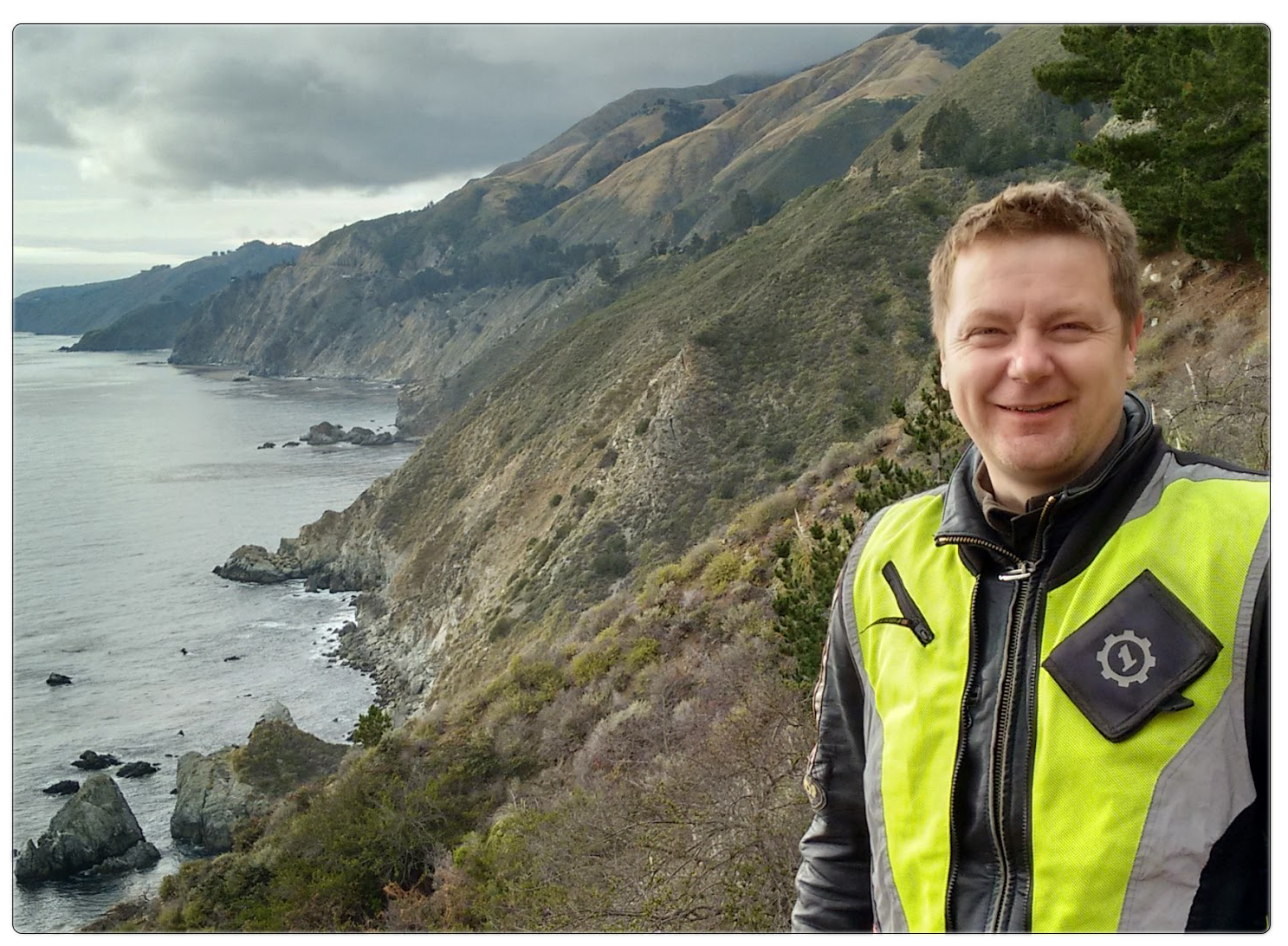 Tour Guide: Zsolt Nagy
Tour Guide: Zsolt Nagy
"I have been riding this magnificent road since June 2006. My preference is to use smaller 2 lane country roads with less daily miles so my group not only enjoys rural America better but gets to know history, heritage and culture more - not to mention meeting local folks who dedicated all their lives entirely to Route 66.
Join us and I ensure you will remember this holiday for the rest of your life!"
To book this tour we need following information from you:
- Rider(s): scan of passport and drivers license, home address, mobile telephone number, e-mail address, required insurance option(s): LDW option, Liability option, motorcycle model choice, room type: one or two beds in room? Any additional hotel rooms before or after the tour?
- Pillion(s): scan of passport
- Will you take the helicopter flight in Grand Canyon? The fee is $289 per person and we need your body-weight, too
- Booking deposit: $1,500 per motorcycle
- Final payment: 6 weeks before tour commences
- Payment method: bank transfer to our bank account. We also accept US personal checks (scanned to e-mail or mailed to our office)
- PayPal and MoneyGram payments are not accepted
- You will sign a rental contract with the motorcycle rental company, you will be renting with them (we already paid your rental fee to them, rental fee is part of the tour fee). Following information is required to complete your paperwork on location: street address, city, country, zip code, license number/expiration/date of birth. Show ID and driver's license. Pay security deposit (excess) with your credit card.
This tour is perhaps not for everyone: one must meet the following requirements:
- At least 1 year heavy-weight motorcycle riding experience
- Able to ride up to 70 mp/h (112 km/h) at times, especially on highways
- Ride in rain: half-face helmets are not the best choice. If possible bring your full-face or protect your face/eyes in rain
- Able to ride up to 1 hour continuously at times
- We do not plan to ride in dark, but you must be prepared to do so
- Must catch up with group, cannot leave much distance between motorcycles. Cars will cut in and you loose sight of group and can get lost eventually.
- Cannot leave group while in formation
- Cannot change riding position in group while in formation
- In traffic jam and extreme heat conditions (very rare but existing scenario) you must be able to ride between other vehicles on center white line (it is legal!) to avoid heatstroke
- No trikes can be rented on this tour
Please note: please do not purchase domestic/international airline tickets until tour is confirmed by us!
